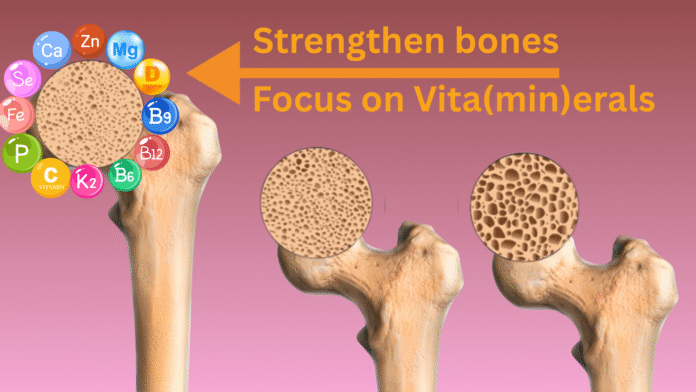When discussing bone health, calcium and phosphorus often take center stage. However, the reality is that maintaining strong and healthy bones requires a multifaceted approach, involving a variety of nutrients that work synergistically to prevent bone degradation and reduce the risk of fractures.
In this blog post, we will delve into the intricate structure of bones, the vital roles of various dietary factors in maintaining bone health, and how these nutrients interact to keep our skeletal system robust.
Understanding Bone Structure
Bones are not merely rigid structures; they are dynamic organs composed of proteins, minerals, bone cells, and water. The primary components of bone include:
– Collagen: Comprising about 90% of bone proteins, collagen provides a flexible framework that supports bone structure.
– Hydroxyapatite (HA): This mineral component, formed from the combination of calcium and phosphate, imparts hardness and strength to bones.
– Bone Cells: There are two main types of cells in bones:
– Osteoblasts: These cells are responsible for synthesizing collagen and osteocalcin, thus facilitating bone formation and mineralization.
– Osteoclasts: These cells break down bone tissue, playing a crucial role in bone remodeling and resorption.
The interplay between these components is essential for maintaining bone density and integrity throughout life.
The Role of Key Nutrients
While calcium and phosphorus are indispensable for bone health, several other nutrients are equally critical for bone formation and strength. Below, we explore these essential nutrients and their specific functions:
1. Vitamin C and Iron
Vitamin C is crucial for the hydroxylation of collagen, a process that strengthens collagen fibers and enhances bone structure. Iron is also necessary for this hydroxylation process, as it serves as a cofactor for enzymes involved in collagen synthesis. However, it is important to note that an overload of iron can inhibit bone-forming cells due to its pro-oxidant effects. Deficiencies in either vitamin C or iron can lead to weak collagen, resulting in fragile bones and an increased risk of fractures.
2. B Vitamins: B6, B9, and B12
The B vitamins play a significant role in bone health by influencing homocysteine levels. Homocysteine, an amino acid produced during methionine metabolism, can interfere with collagen cross-linking, leading to increased bone loss and a higher risk of fractures. Vitamins B6, B9 (folate), and B12 work together to convert homocysteine into cysteine and methionine, thereby reducing its levels in the body and promoting better bone density.
3. Vitamin D
Vitamin D is essential for calcium absorption and the formation of hydroxyapatite, the mineral matrix of bones. A deficiency in vitamin D can lead to conditions such as osteomalacia in adults and rickets in children, characterized by weak and brittle bones. The body synthesizes vitamin D upon exposure to sunlight, but it can also be obtained through dietary sources and supplements. It is important to note that vitamin D must undergo a two-step activation process in the liver and kidneys to become biologically active.
4. Vitamin K2
Vitamin K2 is vital for the proper functioning of osteocalcin, a protein produced by osteoblasts that binds calcium to the bone matrix. Low dietary intake of vitamin K2 has been associated with a higher risk of fractures, as it plays a critical role in bone mineralization. Ensuring adequate intake of vitamin K2 can enhance bone strength and reduce fracture risk.
5. Magnesium and Zinc
Magnesium is necessary for the activation of vitamin D, which in turn is crucial for calcium absorption and bone mineralization. Zinc acts as a cofactor for alkaline phosphatase, an enzyme that converts organic phosphate into inorganic phosphate, essential for the formation of hydroxyapatite. Deficiencies in magnesium or zinc can compromise bone strength and increase the risk of skeletal malformation.
6. Selenium
Selenium serves as an antioxidant, protecting against oxidative stress that can lead to increased bone resorption. Adequate selenium levels are important for maintaining bone density, as selenium-dependent proteins in osteoblasts help prevent cellular damage. A deficiency in selenium can adversely affect bone growth and strength.
Dietary Sources for Bone Health
To ensure you are obtaining the necessary nutrients for strong bones, consider incorporating the following foods into your diet:
– Protein-Rich Foods: Meat, poultry, fish, eggs, dairy, and legumes provide essential amino acids (glycine, proline, and hydroxyproline) required for collagen synthesis.
– Fruits and Vegetables: Citrus fruits, berries, leafy greens, and tomatoes are rich in vitamin C, which is crucial for collagen formation.
– Dairy Products: Excellent sources of calcium; other vegetable sources include broccoli and spinach.
– Whole Grains and Nuts: These foods provide zinc and other minerals essential for bone health.
– Seafood and Shellfish: Rich in zinc and omega-3 fatty acids, which can also contribute positively to bone health.
Conclusion
Maintaining strong bones requires a coordinated intake of various nutrients beyond just calcium and phosphorus. By ensuring a well-balanced diet rich in vitamins and minerals, you can significantly reduce the risk of bone-related issues. It’s essential to recognize that bone health is a lifelong commitment; therefore, start incorporating these essential nutrients into your daily meals for stronger bones.
By understanding the intricate relationship between these nutrients and bone health, you can take proactive steps toward maintaining a robust skeletal system. For more information on nutrition and health, stay tuned to our blog!




